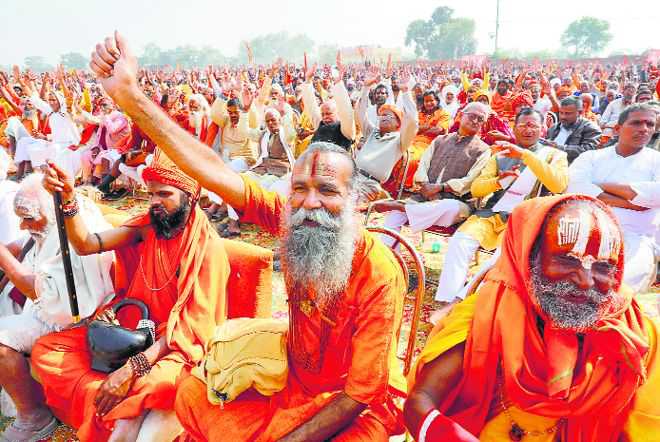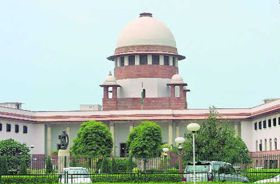
Interpreting the constitution: Articles 25-30 have effectively become a subtle form of discrimination against Hindus.
R Jagannathan
Senior Journalist
It is regrettable that in India we have now begun to question the principle of equality before the law. In a recent article in this newspaper, Faizan Mustafa, Vice Chancellor of Nalsar University of Law, Hyderabad, asked a simple question in the headline: ‘Can Hindus be (a) minority?’ He tried to rubbish the idea floated at a conference of Hindus — which this writer attended as a delegate — seeking ‘equal rights’ to run their own institutions and follow their religious practices.
It is not the purpose of this article to rebut Mustafa’s contentions by quoting past court judgments or resorting to finer aspects of the law. I will do this through logic and common sense. If the law is contrary to the idea of common sense, surely that law is an ass?
The headline of the article is a mislabelling, since Hindus are not seeking minority rights, but equal rights on a par with those available to any group categorised as a minority. If specific Hindu groups have sometimes sought minority rights (Ramakrishna Mission in the late 1980s, and the Lingayats more recently), it is because they have been denied equality under the law.
Mustafa tries to conflate the need for equality with a demand for minority rights, though even the latter can be defended, given than Hindus are not really defined by the Abrahamic standard of one historical founder, one book, and one set of broadly accepted fundamentals. Hindus are often defined by NOTA — none of the above. You are a Hindu if you are not a Muslim, Christian, Buddhist, Jain or Sikh.
From here, it is hardly a stretch to say that all Hindu sects are effectively minority sects, judging by their own sense of religious identity. Using the Abrahamic definition of religion, Hindus are essentially a bunch of minorities with different sampradayas, different rituals and practices. But if some common practices make Hinduism a majority religion, and hence ineligible for equal rights with other minorities, maybe Judaism and Islam, which also have common practices like circumcision and prohibition of pork, ought to be considered the same religion, too.
But let’s leave this aside and repeat: Hindus are not demanding minority rights, but equal rights. Under Article 14 of the Constitution, the state cannot “deny to any person equality before the law or the equal protection of the laws within the territory of India.”
But barring one stray line in Mustafa’s article, where he agrees that Hindus should get minority status in states like J&K and many north-eastern states, he effectively denies the need for equality under the law. As a counter-point, he suggests that Hindus can run their institutions by seeking linguistic minority status: “As linguistic minorities, these Hindu groups are running hundreds of educational institutions. The demand for amending the Constitution is, therefore, absurd.”
Let us examine this issue closely to determine which argument is truly absurd. Under the broad head of linguistic minority, a Kannadiga can set up a minority institution in all states other than his own (ie, Karnataka). Isn’t it absurd that to get the same rights as other minorities, he has to go outside his state, while being denied the same within his home state?
Mustafa makes the observation that “Article 30 gives the same rights to both religious and linguistic minorities, but it nowhere says both religious and linguistic minorities must necessarily be determined at the level of the state.” He is right here. If the state need not be the only geographical area within which one can determine who is a minority, one could quite logically use a region within it, or even a district, to determine rights. But apart from incentivising gerrymandering, isn't it more sensible to say that everyone gets the same rights, no matter which state or region they inhabit?
In his initial remarks, the author makes polemical points by wondering why Hindus have developed a fear complex when they have a BJP government in power with a full parliamentary majority. The grouse of the Hindu parties who met last week to discuss ‘equal rights’ is independent of who is in power. In fact, even an allegedly ‘Hindu nationalist’ BJP is afraid of taking up legitimate Hindu issues for fear of being labelled communal and sectarian. Thus, speaking up for the Pandits of Kashmir or victims of Islamist persecution in Pakistan and Bangladesh has been delegitimised by the ‘secular’ intelligentsia.
Parts of the Constitution, especially Articles 25-30, have effectively become a subtle form of discrimination against Hindus, given the way the courts have chosen to narrowly interpret them. For example, Article 25 allows every citizen the right to profess, practise and propagate religion. This provision benefits only proselytising religions, since they have developed institutions focused on conversion over centuries. Hindus, who do not proselytise, have to either learn those tricks and create those institutions, or allow their numbers to dwindle in favour of the Abrahamic religions.
But here is the element of discrimination. The freedom to propagate is contingent upon owning and controlling the institutions that can enable this — that is temples, educational and healthcare institutions. But more than 100,000 temples in just the five southern states are controlled by the state. So, while Hindus can practise their religion at these temples, they cannot use their resources to propagate. Will the states which control temples then help Hinduism propagate and gain conversions from Islam and Christianity? If Hindus cannot propagate, and the state can't do so either, where is the level playing field in the area of propagating religion for Hindus?
Mustafa and many others of his ilk have got their logic warped. They are essentially party to tilting the playing field against the Hindus. Hence, the demand for equal rights.



























